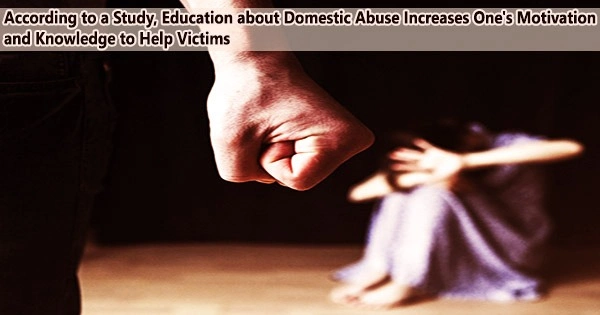Information on domestic violence enables and encourages neighbors, coworkers, and acquaintances to react favorably and helpfully when someone exposes experiences of abuse, according to a recent study by UCL and SafeLives researchers.
The study, published in the journal Trauma, Violence & Abuse, synthesized the findings of 11 existing studies from around the world that examined the effects of domestic abuse training for colleagues, neighbors, or faith leaders.
Domestic violence, also known as intimate partner violence (IPV), is a pattern of abusive behavior in a relationship where one person seeks to gain and maintain power and control over their partner. This abusive behavior can take various forms, including physical, emotional, psychological, sexual, or financial abuse.
The study came to the conclusion that, especially in the near term, educational efforts directed towards friends, coworkers, and neighbors increase their knowledge of domestic abuse, their awareness of how to respond to it, and their drive to do so. The possibility that they will act to support those in violent situations rises as a result.
The study, however, did not uncover any data regarding the type of support that might be offered or if victim-survivors would find it beneficial.
Dr. Karen Schucan Bird (IOE, UCL’s Faculty of Education and Society), the lead author of the research, said, “For people living with domestic abuse, empathetic and helpful responses from friends, colleagues and neighbors are vital. These responses can affect individuals’ safety as well as their well-being, mental health, and decision to seek further help.”
“Our study suggests education can play a role in equipping friends, colleagues and neighbors with the knowledge and skills to react positively and support individuals experiencing abuse. This re-affirms the importance and potential of social and community networks for supporting victims of abuse as part of a societal-wide response.”
“Our findings provide further impetus to employers, community and faith organizations to provide education about domestic abuse as part of their duty of care by upskilling their workers or members and teaching them how best to respond to such situations.”
“To respond positively to disclosures of abuse, it is important to listen with empathy, to create a space where people can explain their situation and experiences without being judged, and to know about helplines and local organizations that can provide expert support.”
Based on research, Dr. Schucan Bird and SafeLives identified four steps for responding positively in the form of “four Rs”:
- Recognize: Become aware of the signs of domestic abuse.
- Respond: Listen without judgment and show empathy.
- Reassure: Convey belief and validate the experiences of your friend, relative or neighbor.
- React: Find out about local sources of support and offer to help.
Domestic violence is a serious and widespread problem that can have severe physical and psychological consequences for the victims. It is essential for individuals experiencing domestic violence to seek help and support. There are many resources available, including shelters, hotlines, counseling services, and legal assistance, to help survivors of domestic violence escape abusive relationships and rebuild their lives.
Out of 9,345 records discovered in academic databases and internet resources, the 11 studies examined in the new publication were selected. They mostly consisted of participant feedback on whether the training they had received had increased their understanding and awareness of domestic violence, with one research offering independent evaluations of these results.
The training covered the same topics and ranged from hour-long online presentations to longer, multi-day courses: fundamental knowledge of risk factors and warning signs of abuse, the effects on businesses, the community at large, and victim survivors, as well as the needs of victim survivors for support. The majority of the information regarding the program’s success was gathered either immediately after the course or three to six months later.
The study discovered statistically substantial proof that informal supporters’ knowledge and attitudes were temporarily improved by educational efforts.
Analyzing these shifts in knowledge and attitudes in light of a behavior change model called COM-B, the paper found evidence that the training fulfilled the three essential conditions for behavior change: capability, opportunity, and motivation.
In other words, the ability to recognize domestic abuse’s warning signs increased opportunities to offer support; the knowledge of the devastating effects that domestic abuse could have increased motivation to offer support; and the capacity to offer support was enhanced by knowledge of the resources that could help, like helplines and domestic abuse charities.
















